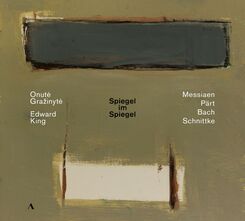Ausdrucksvoll und mit reichem Vibrato spielt der neuseeländische Cellist Edward King Olivier Messiaens Louange à l’Eternite de Jésus, worauf eine kontrastreiche und nicht weniger expressive Fassung von Fratres für Cello und Klavier folgt. Angenehm tänzerisch erklingt dann Bach Gambensonate BWV 1027. Für Abwechslung sorgt Pärts Da pacem Domine mit dem Aidija Chamber Choir, wunderbar kontrastreich mit ätherischen Sopranstimmen über dem Rest des Chores.
Der Kontrast zur tief melancholischen, wenn nicht gar depressiven ersten Cellosonate von Schnittke könnte nicht grösser sein.
Die Sonate besteht aus drei Sätzen, langsam-schnell-langsam, wobei der schnelle Satz ein motorisches Presto ist, das hier in seiner ganzen Unerbittlichkeit erklingt, ehe wieder Melancholie angesagt ist. Melancholisch geht es weiter mit Pärts ‘Spiegel im Spiegel’.
Abschließend erklingt der letzte Satz aus Messiaens Quatuor pour la fin du temps, im Original für Violine geschrieben. Dieser sehr langsame Satz vereint hier das Cello und das Klavier in einem unendlich langsamen, ekstatischen Gesang des Cellos.
Das expressive Klavier von Onute Grazinyte ist von großem Reichtum, und Edward Kings mit Kraft bis an die Grenzen der hohen Töne getriebene Cellolinie trägt meisterhaft zur Intensität der Interpretation bei.
The New Zealand cellist Edward King plays Olivier Messiaen’s Louange à l’Eternite de Jésus expressively and with a rich vibrato, followed by a contrasting and no less expressive version of Fratres for cello and piano. Bach’s viola da gamba sonata BWV 1027 then sounds pleasantly dance-like, while Pärt’s Da pacem Domine with the Aidija Chamber Choir provides variety, wonderfully rich in contrast with ethereal soprano voices above the rest of the choir.
The contrast to the deeply melancholy, if not depressive, first cello sonata by Schnittke could not be greater.
The sonata consists of three movements, slow-fast-slow, whereby the fast movement is a motoric Presto, which is heard here in all its relentlessness, before melancholy turns in again. The melancholy continues with Pärt’s ‘Spiegel im Spiegel’.
Finally, we hear the last movement from Messiaen’s Quatuor pour la fin du temps, originally written for violin. This very slow movement unites the cello and piano in an infinitely slow, ecstatic song of the cello.
Onute Grazinyte’s expressive piano is of great richness, and Edward King’s cello line, driven with power to the limits of the high notes, contributes masterfully to the intensity of the interpretation.




















